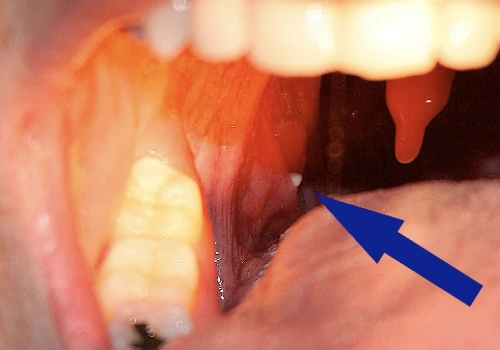
What Are Tonsil Stones?
Tonsil stones, also known as tonsilloliths, are small, hard formations that develop in the crevices of the tonsils. They are made up of trapped debris such as dead cells, mucus, and food particles that calcify over time. While usually harmless, they can cause unpleasant symptoms like bad breath, sore throat, and a sensation of something being stuck in the back of the mouth.
Common Symptoms of Tonsil Stones
Many people don’t realize they have tonsil stones until they see or feel one. Common symptoms include:
- Chronic bad breath (halitosis)
- A sore or scratchy throat
- Difficulty swallowing
- Ear pain (referred pain)
- Visible white or yellow debris on the tonsils
- Swollen tonsils or throat irritation
Can Tonsil Stones Go Away on Their Own?
In many cases, yes—tonsil stones can go away on their own. Smaller stones may dislodge naturally when eating, drinking, coughing, or brushing your teeth. Your body can also break them down and reabsorb them.
However, larger or persistent tonsil stones may require manual removal or medical treatment. If you're frequently experiencing discomfort, bad breath, or recurring stones, it’s best to speak with an ENT specialist.
When to See a Doctor
You should seek medical attention if you:
- Have recurring or large tonsil stones
- Experience persistent bad breath
- Notice tonsil swelling or infection
- Feel like there's a lump in your throat
- Have trouble swallowing
At BASS Medical Group, our ear, nose, and throat (ENT) specialists can help evaluate the severity of your tonsil stones and recommend the best treatment options—from saltwater rinses to tonsillectomy for chronic cases.
Prevention Tips
To help prevent tonsil stones:
- Practice good oral hygiene
- Use a water flosser or gargle saltwater regularly
- Stay hydrated
- Avoid smoking
- Manage post-nasal drip and allergies
Takeaway
Tonsil stones are common and often harmless—but they can be annoying and uncomfortable. In many cases, they’ll go away on their own. But if you’re dealing with frequent symptoms, the ENT team at BASS Medical Group is here to help you find lasting relief.
Book an appointment today with one of our ENT specialists to discuss tonsil stones or any throat-related concerns.
Frequently Asked Questions
Q: What causes tonsil stones to form?
A: Tonsil stones form when food particles, dead cells, bacteria, and mucus get trapped in the tonsil crypts. Over time, this debris hardens and calcifies into small stones.
Q: Are tonsil stones dangerous?
A: Tonsil stones are usually not dangerous but can be uncomfortable. If left untreated, large stones may cause inflammation or infection. See a doctor if symptoms persist or worsen.




